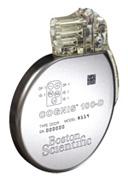
February 10, 2011 – Never before has a therapy proven more beneficial for women than men in preventing heart disease – until now.
A new study, published in the Journal of the American College of Cardiology, found that women receive a significantly greater benefit – a 70 percent reduction in heart failure and a 72 percent reduction in death – from cardiac resynchronization therapy with defibrillator (CRT-D) than men.
“In prior cardiac studies, men and women generally received similar benefit from preventive medical therapy,” said cardiologist Arthur J. Moss, M.D., professor of medicine at the University of Rochester Medical Center and lead author of the study. “Our finding was unexpected, but extremely important because this is the only heart treatment that is clearly better in women than men.”
Historically, heart disease has been dominated by its association with men. But thanks to successful awareness campaigns in recent years, such as the American Heart Association’s Go Red for Women initiative, women have started to take note of their risks and take action to protect their health.
On all fronts, women receiving CRT-D therapy to prevent heart failure progression had significantly better outcomes than men receiving the therapy. Reduction of heart failure in females was twice that of males – 70 percent versus 35 percent.
In women with mild heart failure, CRT-D therapy effectively prevented deterioration of the heart, otherwise known as cardiac remodeling, by preventing enlargement of the heart with more effective contraction of the heart.
Study authors investigated the reasons for the significantly better result in women than men. Women in the study were more likely to have non-ischemic heart disease, a disorder typically characterized by inflammatory scarring of the heart muscle. However, men had a greater likelihood of ischemic heart disease – otherwise known as coronary artery disease – where narrowed arteries restrict the flow of blood and oxygen to the heart. Additionally, more women had left bundle branch block, a condition that results in disorganized electrical activity throughout the heart.
Because left bundle branch block and non-ischemic heart disease lead to diffuse, as opposed to localized, heart problems, study authors reasoned women were more responsive to CRT-D therapy. The treatment strengthens the overall mechanical pumping action of the heart and coordinates the heart’s electrical activity.
“It’s not that men did poorly in the trial, but rather, women had really fantastic results, likely due to they type of heart disease we see more commonly in women,” Moss said.
The CRT-D device, developed by Boston Scientific, was originally approved to treat patients with severe heart failure. In September 2010, the U.S. Food and Drug Administration extended the approval of the Boston Scientific device to patients with mild heart failure to prevent progression to advanced heart failure.
CRT-D therapy combines an implantable cardioverter defibrillator (ICD), which is designed to prevent sudden, rhythm-related cardiac death, with cardiac resynchronization therapy (CRT), which improves heart function with a reduction in heart failure and associated symptoms.
The study is a sub-analysis of the MADIT-CRT trial that was published in 2009 in the New England Journal of Medicine. The study involved 1,820 participants from 110 medical centers in the United States, Canada and Europe and compared the effectiveness of CRT-D versus ICD therapy in reducing heart failure and death during four and one-half years of follow-up. Twenty-five percent, or 453 of the study participants, were female.
For more information: www.bostonscientific.com


 January 05, 2026
January 05, 2026 









